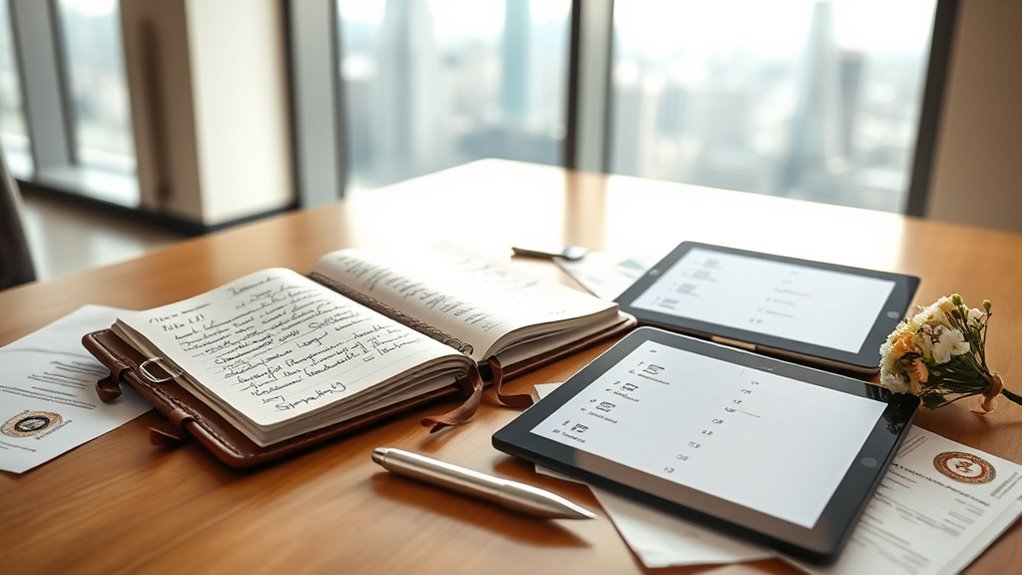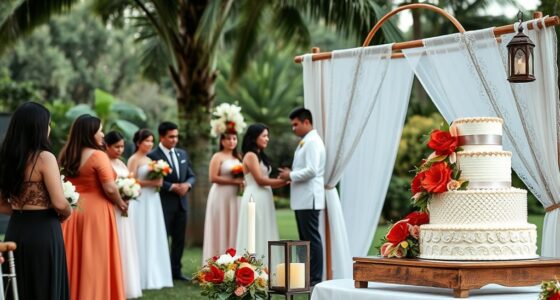After your wedding abroad, start by gathering and translating important documents like your birth certificate and passport, then get them notarized or apostilled. Apply for your visa and register your marriage with local authorities to obtain your marriage certificate and multiple certified copies. Organize everything carefully, keeping digital backups and tracking deadlines. Understanding the legal steps and preparing thoroughly will make your next moves smoother; continue to learn what further steps you should take.
Key Takeaways
- Obtain multiple certified copies of the marriage certificate for legal and immigration purposes.
- Update personal identification documents, such as passport and national ID, to reflect marital status.
- Gather and translate all marriage-related documents, notarize or apostille as required.
- Prepare and submit visa or residence permit applications with marriage proof.
- Organize and securely store all legal documents and correspondence for easy access and record-keeping.

Getting married abroad involves more than just tying the knot; it also means handling important paperwork to guarantee your new status is recognized. One of your first priorities is organizing the necessary legal documentation. This typically includes your birth certificates, passports, and proof of termination of any previous marriages if applicable. Many countries require these documents to be officially translated into the local language and sometimes notarized or apostilled to verify their authenticity. You’ll want to start gathering these well in advance to avoid delays later on. Making sure your legal documentation is complete and correctly prepared is critical because it forms the foundation for all subsequent steps, including your visa procedures. Additionally, understanding the emotional support needs of family members involved can help ease the transition and reduce stress during this process.
Once your legal documentation is in order, you need to focus on the visa procedures. Different countries have varying requirements for foreign spouses, so it’s essential to research the specific process for your destination. Usually, you’ll need to apply for a marriage or spouse visa, which permits you to stay and live with your partner legally. This process often involves submitting your legal documents, proof of marriage, and evidence of your relationship. Some countries also require a medical examination and background checks. Be prepared for a waiting period, which can range from a few weeks to several months, depending on the country. During this time, you may need to attend interviews or provide additional documentation. Staying organized and attentive to deadlines will help streamline your application.
In addition to legal documentation and visa procedures, you might need to handle other paperwork like registering your marriage locally or obtaining a marriage certificate. Depending on local laws, your marriage might need to be registered with local authorities to be legally recognized. Some countries issue marriage certificates immediately, while others require a waiting period or additional paperwork. Once you have your marriage certificate, consider requesting multiple certified copies—these will be useful for future immigration applications, legal processes, or changing your official status in your home country.
Finally, keep copies of all documents and correspondence related to your marriage and visa process. Digital copies stored securely will save you stress if originals get lost or damaged. Staying organized from the start helps you avoid unnecessary delays and guarantees you meet all legal and immigration requirements. By paying close attention to your legal documentation and carefully steering through visa procedures, you’ll set a strong foundation for your life together abroad.
Frequently Asked Questions
How Long Does the Post-Wedding Paperwork Process Typically Take?
The marriage certificate processing time varies, but it usually takes a few weeks to a few months, depending on your location. You should stay aware of document submission deadlines to avoid delays. To guarantee smooth processing, gather all required documents quickly and submit them promptly. Keep track of your application’s progress, and contact the relevant office if you experience any unexpected delays. Patience and organization will help you complete the process efficiently.
Are Translations Required for Foreign Marriage Documents?
Did you know that over 60% of foreign marriage documents require translations? Yes, translation requirements are common for legal validity. You’ll likely need to provide certified translations of your marriage documents, which means having them officially translated and notarized. Check your local authorities’ rules, because document certification is often essential to make certain your paperwork is accepted without delays. This step helps avoid complications in your post-wedding process.
Can I Complete Paperwork Remotely From Abroad?
You can often complete your paperwork remotely from abroad by utilizing remote verification processes and submitting necessary document apostilles. Many authorities allow you to send scanned copies or certified translations online, making it convenient to handle your marriage paperwork without returning to your home country. Just verify the specific requirements for your destination, and arrange for apostilles to authenticate your documents for legal use abroad.
What Are Common Mistakes to Avoid in Post-Wedding Paperwork?
Ah, the thrill of post-wedding paperwork—who knew paperwork could be so exciting? To avoid mishaps, double-check your marriage certificate accuracy; a tiny typo could cause a big delay. Never skip document notarization, or your documents might not hold water. Keep copies of everything and stay organized; losing essential papers is a rookie mistake. Your future self will thank you for avoiding these pitfalls and ensuring smooth processing.
Is Legal Assistance Recommended for Foreign Grooms?
You should consider legal assistance to guarantee your paperwork is accurate and complete. A legal consultation helps clarify requirements and guides you through complex processes, reducing mistakes. It’s also essential for document verification, making sure all your papers meet legal standards. By getting professional help, you avoid delays or errors that could impact your immigration status or future plans, giving you peace of mind during this important time.
Conclusion
So, after all the paperwork and visa hurdles, you might think the real challenge is over. But don’t forget: the true test begins once you’re steering everyday life in a new country. Ironically, all those documents now seem like just the beginning—proof that love’s paperwork is never truly finished. Embrace it, because in the end, your biggest milestone might just be turning all those stamps and forms into a shared story.









